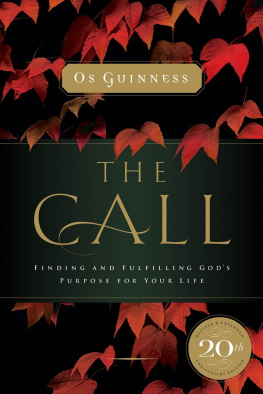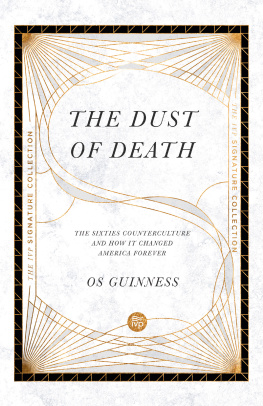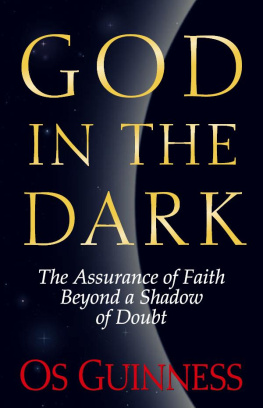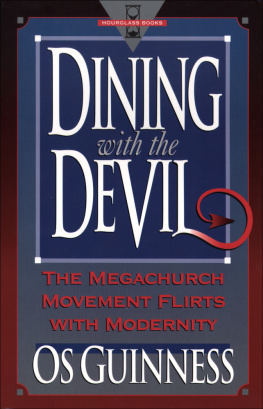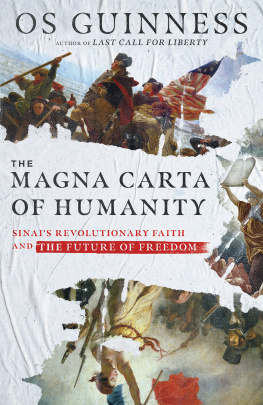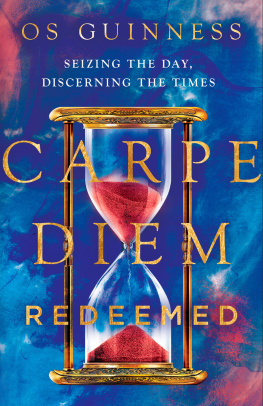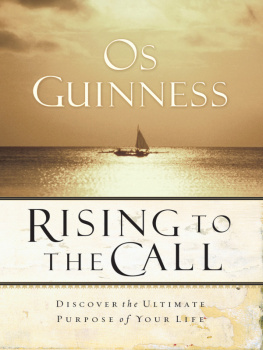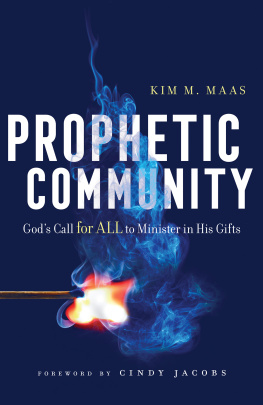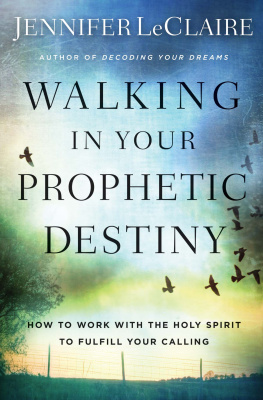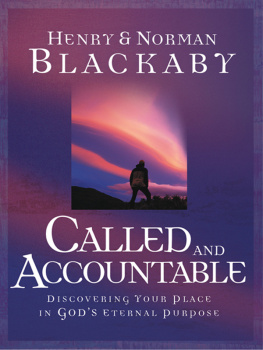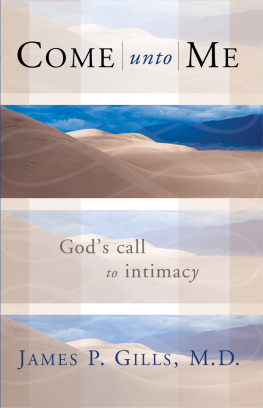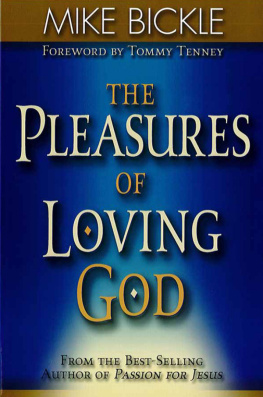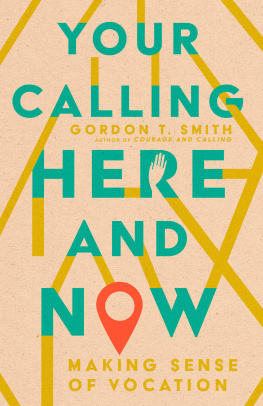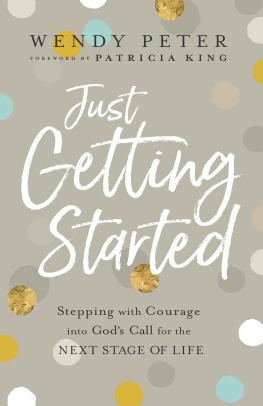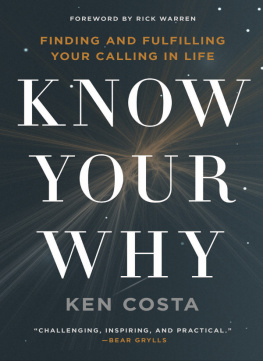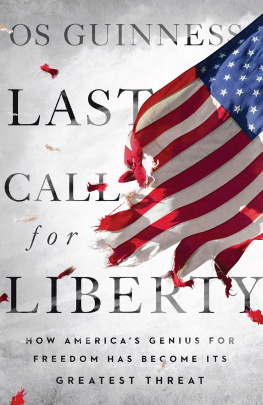1998, 2003, 2018 Os Guinness
All rights reserved. No portion of this book may be reproduced, stored in a retrieval system, or transmitted in any form or by any meanselectronic, mechanical, photocopy, recording, scanning, or otherexcept for brief quotations in critical reviews or articles, without the prior written permission of the publisher.
Published in Nashville, Tennessee, by W Publishing, an imprint of Thomas Nelson.
Thomas Nelson titles may be purchased in bulk for educational, business, fund-raising, or sales promotional use. For information, please e-mail SpecialMarkets@ThomasNelson.com.
Scripture quotations are taken from the Holy Bible, New International Version, niv. Copyright 1973, 1978, 1984, 2011 by Biblica, Inc. Used by permission of Zondervan. All rights reserved worldwide. www.Zondervan.com. The NIV and New International Version are trademarks registered in the United States Patent and Trademark Office by Biblica, Inc.
Any Internet addresses, phone numbers, or company or product information printed in this book are offered as a resource and are not intended in any way to be or to imply an endorsement by Thomas Nelson, nor does Thomas Nelson vouch for the existence, content, or services of these sites, phone numbers, companies, or products beyond the life of this book.
The author expresses appreciation for permission to reprint from these sources:
Amadeus by Peter Schaffer. Copyright 1980, 1981 by Peter Schaffer. Published by HarperCollins.
The Memorial from Penses by Blaise Pascal, translated by A.J. Krailsheimer. Published by Penguin Classics.
Who Am I? by Dietrich Bonhoeffer from Letters and Papers from Prison, The Enlarged Edition 1971 by SCM Press and by HarperCollins Publishers, Ltd.
Sonnet No. 285 from The Poetry of Michelangelo, translated by James M. Saslow. Published by Yale University Press.
Epub Edition May 2018 9780785220107
ISBN 978-0-7852-2010-7 (eBook)
ISBN 978-0-7852-2007-7 (repackage)
Library of Congress Cataloging-in-Publication Data
Guinness, Os.
The Call / by Os Guinness.
p. cm.
Originally published: Nashville, TN: Word, 1998.
ISBN 978-0-8499-4437-6
1. VocationChristianityMeditations. 2. Devotional calendars. I. Title.
BV4740.G85 2018
248.4dc21
2003012331
Printed in the United States of America
18 19 20 21 22 LSC 10 9 8 7 6 5 4 3 2 1
Ebook Instructions
In this ebook edition, please use your devices note-taking functionto record your thoughts wherever you see the bracketed instructions [Your Notes]. Use your devices highlighting function to record your response whenever you are asked to checkmark,circle, underline, or otherwise indicate your answer(s).
DOM
and to CJ
with love, gratitude, and immense pride.
CONTENTS
Note:These chapters have been written as a series of individual meditations, to be read one day at a time.
Guide
T he greatest gift in life is life itself. Your life is not an accident. God wanted you to be. How then are you searching for purpose in your life, your own ultimate why for everything you do? For a purpose big enough to absorb every ounce of your attention, deep enough to plumb every mystery of your passions, and lasting enough to inspire you until your last breath on earth? Nothing, absolutely nothing, is more powerful, more intimate, and more important than to listen to the call of God our Creator, and to realign yourself to the very purpose of life and the universe by following his call wherever your life leads. God wanted you to be, so responding to his call is the secret to making the most of life, the key to the deepest relationships, the surest road to self-knowledge and unfolding purpose, the most challenging, enthralling, and natural way to live life, and the way to make the most of the great adventure that forms our days as humans in this world.
Gods call is at the very heart of Gods good news, the best news ever. Yet if we are to discover all that Gods call should mean to us, we may need to rescue it from the weight of clichs, confusion, ignorance, and uncertainties that still commonly surround calling today. We will encounter many of these distortions along the path as we explore the great truth of Gods call more fully. But it is worth highlighting two broad and crippling distortions from the startthe shrinking and the hollowing out of calling.
First, there has been a dire shrinkage in how we understand Gods call by drastically reducing the immensity of its significance to our individual lives alone. It then becomes all about usI, myself, and me, because were worth it. Calling certainly speaks to each of us individually, personally, and intimately, yet at the same time it is Gods call, and it is his call to a new humanity, to a new way of life, and to a role in working toward the new heaven and the new earth. It is therefore awesome in its creative power and comprehensive in its wide-ranging imperatives. And, not surprisingly, Gods call has a proven track record of shaping history and making a difference in the world that is culture-wide for societies just as it is life-long for individuals. We need to recapture that awe and that immensity from the start and see how we each fit into the grand picture that is so much bigger than just us.
EARTH-SHAKING, HISTORY-SHAPING
I was born in China and grew up in Nanjing, the capital of Nationalist China and the former capital of the mighty empire of the Ming Dynasty. The city had been brutalized by the horrific rape of Nanking in 1937, and after World War II it was threatened by the looming Red Army that was fighting its way closer from the north. But its magnificent city walls, its beautiful tree-lined avenues, and its historic Ming Tombs still bore the marks of its once-glorious past. For, in the fifteenth century, Nanjing was the proud capital of the richest and most powerful country in the world.
With an assurance born of thousands of years of Chinese power and greatness, and with a string of stunning innovations behind them, the Ming Emperors were expansive in their enterprises, and they could afford to be. They sent an admiral and a huge fleet to Africa, with ships far bigger and faster than Columbuss, and then dispatched a million men to build the one hundred thousand houses of the new Forbidden City in Beijing. So, in A.D. 1500, who in their right mind would ever have believed that China would suddenly be eclipsed and then passed and dominated by a region of the world the Chinese considered a cultural backwaterWestern Europe, the rocky little outcrop at the other end of the great Asian landmass?
Yet that of course is what happened. And centuries later, when the Chinese pride was restored, and China regained its superpower standing on the world stage, the Chinese asked how it was that Europe, and later the West at large, had leapfrogged them to become the vanguard of the modern world. In his book Civilization, historian Niall Ferguson described their inquiry in the words of a scholar from the Chinese Academy of the Social Sciences:
We were asked to look into what accounted for the... pre-eminence of the West all over the world.... At first, we thought it was because you had more powerful guns than we had. Then we thought it was because you had the best political system. Next we focused on your economic system. But in the past twenty years, we have realized that the heart of your culture is your religion: Christianity. That is why the West has been so powerful.
For anyone listening in on that Chinese investigation, its conclusion was brilliant but not quite right, because it begged an important question. The Christian faith had been predominant in Europe ever since the fourth century when the Emperor Theodosius had declared Rome officially Christian. Why then did Western Europe not rise to dominance before, and why did it rise so rapidly and to such prominence in the sixteenth century? The answer is not so much Christianity in general as it is the Reformation in particular. In their massive rejection of medieval corruptions and distortions, Martin Luther, John Calvin, and the other Reformers restored to the church not only the gospel, the authority of the Scriptures, and the importance of lay people. They restored many biblical truths that had been distorted and forgotten for a long time.
Next page
